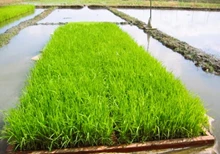
According to the Ministry of Agriculture & Farmers' Welfare's weekly report of sowing statistics, farmers have boosted the area under rapeseed, the main winter-sown oilseed, to 7.1 million hectares as of Nov. 25, up from 6.2 million hectares the previous year.
According to agriculture experts and producers, a severe run of post-monsoon rainfall in October and November increased soil moisture levels and helped farmers plant more wheat, the key winter crop.
As per the official data, Indian farmers have planted wheat on 15.3 million hectares since October 1, when the current sowing season began, up roughly 11% from a year earlier, as record high prices have spurred planting.
The higher wheat output might persuade India, the world's second-largest producer of the crop, to reconsider easing a May ban on exports of the staple.
India, the world's second-largest consumer of wheat, barred exports after a surge in international shipments following Russia's invasion of wheat producer Ukraine prompted concerns about local supply, despite a harsh heat wave that shriveled the harvest.
Despite the prohibition, wheat prices have reached an all-time high, forcing the government to consider steps such as releasing state reserves into the open market and eliminating the 40 percent import tariff to temper prices.
The overall oilseed area production reached 7.6 million hectares between October 1 and November 15, up from 6.7 million hectares during the same period the previous year.
Increased oilseed output would enable India, the world's largest cooking oil importer, to reduce its reliance on pricey edible oils from Malaysia, Indonesia, Brazil, Argentina, Russia, and Ukraine.
New Delhi paid a record $18.99 billion on vegetable oil imports in the fiscal year ending March 31, 2022, causing Prime Minister Narendra Modi to express alarm over India's soaring vegetable oil import cost.
New Delhi has granted environmental permission for indigenously created genetically modified mustard seeds, which are part of the rapeseed family, as part of attempts to lessen India's reliance on edible oil imports.










